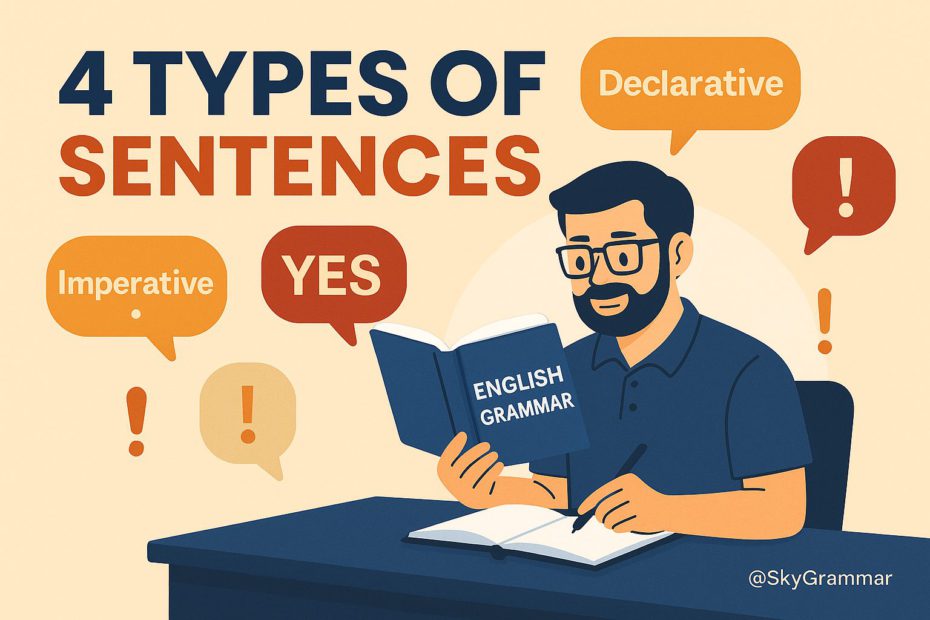In the English language, sentences serve as the foundation for clear and effective communication. Every sentence serves a specific purpose, and understanding the different types can greatly improve both your writing and speaking skills. Whether you’re crafting an essay, giving a speech, or simply having a conversation, knowing how to use different sentence types allows you to express thoughts with clarity and intention.
English grammar categorizes sentences into four primary types, each serving a distinct purpose in communication.
- Declarative
- Interrogative
- Imperative
- Exclamatory
Each type has a unique function and punctuation pattern. Let’s explore them in detail with definitions, examples, and usage tips.
1️⃣ Declarative Sentences: Making Statements
Definition:
A declarative sentence is used to present information, express an opinion, or convey an idea. It simply “declares” something and ends with a period (.).
Function:
This sentence type is the most frequently used and is meant to communicate facts or ideas in a clear and straightforward manner.
Examples:
- The sun rises in the east.
- I enjoy reading historical fiction.
- She is a brilliant speaker.
Usage Tip:
Use declarative sentences to provide information, make observations, or express general truths. They form the backbone of most written texts.
Variation:
Declarative sentences can be positive or negative.
- Positive: They have arrived.
- Negative: They have not arrived yet.
2️⃣ Interrogative Sentences: Asking Questions
Definition:
An interrogative sentence asks a question and ends with a question mark (?).
Function:
These types of sentences are used to request information and typically start with question words such as who, what, where, when, why, or how.
Examples:
- Where did you put the keys?
- Have you finished your homework?
- Why is she upset?
Types of Questions:
- Yes/No questions are structured to receive a simple affirmative or negative response.
➤ Are you coming to the meeting? - Wh- Questions: Begin with a question word.
➤ What time does the movie start? - Choice Questions: Offer options.
➤ Would you prefer coffee or tea? - Tag Questions: Include a brief follow-up question at the end.
➤ You’re going, aren’t you?
Usage Tip:
Interrogative sentences are useful for collecting information, ensuring clarity, or initiating conversation.
3️⃣ Imperative Sentences: Giving Commands
Definition:
An imperative sentence is used to issue a directive, offer guidance, or make a polite request. It usually ends with a period (.), but can also end with an exclamation mark (!) for emphasis.
Function:
Imperative sentences typically include an implied subject—‘you’—which is understood without being explicitly mentioned.
Examples:
- Please close the door.
- Sit down.
- Don’t talk during the movie!
Polite Requests:
To soften the tone, imperatives can be phrased more politely using words like please or kindly:
- Kindly submit the report by Friday.
- Please be quiet.
Negative Imperatives:
Used to tell someone what not to do.
- Don’t forget your umbrella.
- Never lie to your friends.
Usage Tip:
Use this sentence type in instructions, recipes, directions, and rules.
4️⃣ Exclamatory Sentences: Expressing Strong Emotio
Definition:
An exclamatory sentence expresses strong feelings or emotion and ends with an exclamation mark (!).
Function:
This sentence type conveys excitement, surprise, anger, joy, or any intense emotion.
Examples:
- What a beautiful sunset!
- I can’t believe we won!
- Watch out!
Structure Note:
Sometimes exclamatory sentences begin with “What” or “How” followed by a noun phrase or adjective.
- What an incredible story!
- How sweet of you!
Caution:
Don’t overuse exclamatory sentences in formal writing—they’re best for creative or informal contexts.
Comparing the Four Types
Let’s look at how the same idea can be expressed in each sentence type:
Base idea: It is raining.
- Declarative: It is raining.
- Interrogative: Is it raining?
- Imperative: Take an umbrella.
- Exclamatory: What terrible weather!
This example shows how sentence type changes not just punctuation, but tone and intent.
Sentence Types and Their Punctuation
| Sentence Type | Purpose | Ends With |
|---|---|---|
| Declarative | States a fact or opinion | Period (.) |
| Interrogative | Asks a question | Question mark (?) |
| Imperative | Gives a command or request | Period (.) / (!) |
| Exclamatory | Expresses emotion | Exclamation mark (!) |
Why Understanding Sentence Types Matters
Knowing the four sentence types helps you:
- Write with variety and rhythm
- Match tone to context (formal, informal, emotional)
- Improve clarity and expression
- Avoid monotony in essays or emails
For example, in persuasive writing, a mix of declarative and exclamatory sentences can be more impactful:
We need action now. Let’s stand together and make a difference!
In technical or instructional writing, imperatives dominate:
Press the button. Wait for the signal. Then proceed.
Final Thoughts
Mastering the four types of sentences—declarative, interrogative, imperative, and exclamatory—will give you a flexible toolset for effective communication. Whether you’re delivering information, asking questions, issuing instructions, or expressing emotions, the right sentence type enhances your message.
Next time you write or speak, pause and consider: What am I trying to say? The answer will guide you to the right sentence structure.

